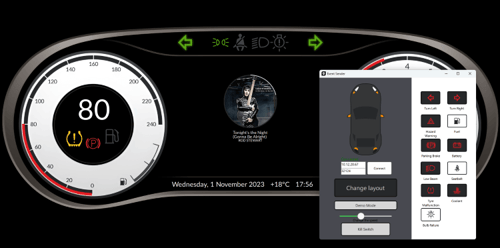Qt 5.11 released
May 22, 2018 by Lars Knoll | Comments
Slightly ahead of our planned schedule, we have released Qt 5.11 today. As always, Qt 5.11 comes with quite a few new features as well as many bug fixes to existing functionality. Let’s have a look at some of the cool new features.
Qt Core and Network
A lot of work on small details has happened in Qt Core. As an example, some of our tools classes got new rvalue reference overloads and we filled in some missing methods for better STL compatibility. Our item model has received a couple of new features, for details have a look at this blog post.
In Qt Network, ALPN and thus HTTP/2 negotiation are now supported on iOS. QNetworkRequest gained a Http2DirectAttribute to start an HTTP/2 connection without first negotiating.
One of the larger updates in Qt Core went into our Unicode support. QChar, QString, QTextBoundaryFinder and our algorithm for bidirectional text are now fully compatible with Unicode 10.
Qt GUI and Widgets
A major focus area for Qt 5.11 has been the accessibility support on Windows. It got completely rewritten and is now based on Microsoft UI Automation, not on the old Microsoft Active Accessibility framework, leading to a vastly improved accessibility support on Windows.
Some major work has also gone into improving the widget styles on Windows to better support High-DPI displays. The print dialog on Linux has also received a major overhaul, now featuring much better support for all the CUPS provided options.
Qt Widgets itself has received numerous bug fixes and support for quick text selection by mouse in QLineEdit.
Together, this gives a very nice update for all our Desktop users.
Qt QML
Some larger changes have been happening under the hood of our QML engine. We have completely rewritten the compiler pipeline, that parses and compiles QML. The new pipeline brings some major improvements in performance and maintainability.
The new pipeline always compiles QML to a platform-independent bytecode. The engine will cache this bytecode in .qmlc files. You can also generate the bytecode ahead of time, using the qmlcompiler feature (which is now also available in the open source version).
The new bytecode interpreter has a vastly improved performance over the old version. It reaches around 80-90% of the performance of the JIT in Qt 5.10 in most of our test cases. A new hotspot JIT has been added on top of that, beating our old JIT in pretty much all areas.
For more details, have a look at the separate blog post here.
Qt Quick and Qt Quick Controls
In Qt Quick, we’ve expanded our support for loading compressed textures in the Image element and now support both .ktx and .pkm container file formats. This feature helps cut down on application startup time and memory consumption by storing images in a format that is directly digestible by the GPU. For more details have a look at this blog post.
Qt Quick Controls 2 has received lots of smaller features and bug fixes. Examples are auto-repeat properties for Buttons, better positioning support for ScrollBars and better styling support for SpinBoxes.
Qt Location
Qt Location is also an area where many cool things have been happening. The largest new feature is probably the experimental support for turn-by-turn navigation. But there is more. Qt Location now has an experimental API to create map objects that are not bound to QQuickItems. The performance of MapPolyline objects has seen large improvements and layers are now working in combination with Map items. In addition, we made the Routing and Places API extensible and added a new WayPoint element. Finally, the MapBox plugin gained support for geocoding and Places.
Qt Webengine
As has become standard in our feature releases, we’ve updated the Chromium version underneath Qt Webengine to Chromium 65. In addition, we now support embedded DevTools without requiring the use of a separate browser, an installable cookie filter and quota permissions.
Qt for Device Creation
All new functionality mentioned above is of course also available in Qt for Device Creation. In addition, we’ve been working on improving some embedded-specific features.
One new feature here is support for hardware-based graphics layers, currently available as a Technology Preview for platforms supporting VSP2 hardware compositing. This can be used for features such as Video underlays and helps improve performance and reduce power consumption. We are aiming to extend the support to more platforms and hardware combinations in future releases.
Qt SerialBus has received improvements to its CAN Bus support. The KNX module has received some larger updates. In addition, Qt 5.11 will feature a new module that adds support for OPC/UA. This module is available as a Technology Preview in Qt 5.11.
Other items
qdoc now uses libclang to parse C++ giving us much better support for modern C++ in our documentation. Qt Serialbus and Bluetooth have now improved support for CAN bus and BTLE.
With Qt 5.11, we have also removed support for some older compilers and platforms. MSVC 2013, QNX 6.6 and macOS 10.10 are no longer supported.
Qt 3D and Qt 3D Studio
We are working hard to get the second release of Qt 3D Studio ready for you. This second release comes with a fully rewritten runtime, that’ll be based on top of Qt 3D. This will give all of you a better and deeper integration into the rest of Qt when using Qt 3D Studio to create 3D user interfaces. With this work, Qt 3D has also received numerous new features, performance improvements, and bug fixes. Qt 3D Studio 2.0 is currently in beta, and we are working hard to get the final release out within the next few weeks.
Qt for Webassembly and Python
With Qt for Webassembly, we are working towards filling the last large gap in our cross-platform story, allowing our users to target the web and browsers as a platform for Qt applications. The first version has been released as a Technology preview today, please check out the separate blog post for further details.
In addition, to the above, we are actively working on supporting Qt on Python . The first release of it is planned for June, and we’ll keep you posted with more details.
Thanks to the Qt Community
Qt 5.11 adds a lot of new functionality and improvements. Some of them would not have been possible without the help of the great community of companies and people that contribute to Qt by contributing new functionality, bug fixes, documentation, examples or bug reports. There are too many people to mention everybody in detail, but I’d like to especially thank Thiago Maciera from Intel for his ongoing work on maintaining Qt Core. From our partner basysKom, I’d like to thank Jannis Voelker and Frank Meerkötter for their work on OPC/UA. From our partner KDAB, I’d like to thank Albert Astals Cid for his work on CUPS printing, Sean Harmer and Paul Lemire for their ongoing work on Qt 3D and many others for helping maintain different parts of Qt. Thank you!
Get the new version
As usual, Qt 5.11 will be supported for one year. If you need longer support periods, Qt 5.9 is our current LTS release and will be supported until June 2020. Extended lifetime support can of course always be purchased from The Qt Company if required. Our next release after Qt 5.11, Qt 5.12 is planned for November and will again be a long-term supported release.
You can download Qt 5.11 from your Qt Account or www.qt.io/download. I hope you’ll like and enjoy the new release!
Blog Topics:
Comments
Subscribe to our newsletter
Subscribe Newsletter
Try Qt 6.7 Now!
Download the latest release here: www.qt.io/download.
Qt 6.7 focuses on the expansion of supported platforms and industry standards. This makes code written with Qt more sustainable and brings more value in Qt as a long-term investment.
We're Hiring
Check out all our open positions here and follow us on Instagram to see what it's like to be #QtPeople.



